IMPORTANCE OF HOLISTIC DEVELOPMENT IN EARLY CHILDHOOD
Holistic development in early childhood plays a crucial role in preparing young children for their future. It encourages the development of an individual’s physical, mental, emotional and social skills during this important life stage.
This kind of learning helps to create a supportive environment for each child to develop the skills they need for their growth over time.
Understanding the importance of holistic development will help build strong foundations for your child’s future, giving them the best opportunities for continued growth and lifelong success.
This gives them an open door to not just academic success in life but also a foundation for lifelong wellbeing.
Encouraging holistic development in the earliest stages of life sets up the child with invaluable resources that last into adulthood and beyond.
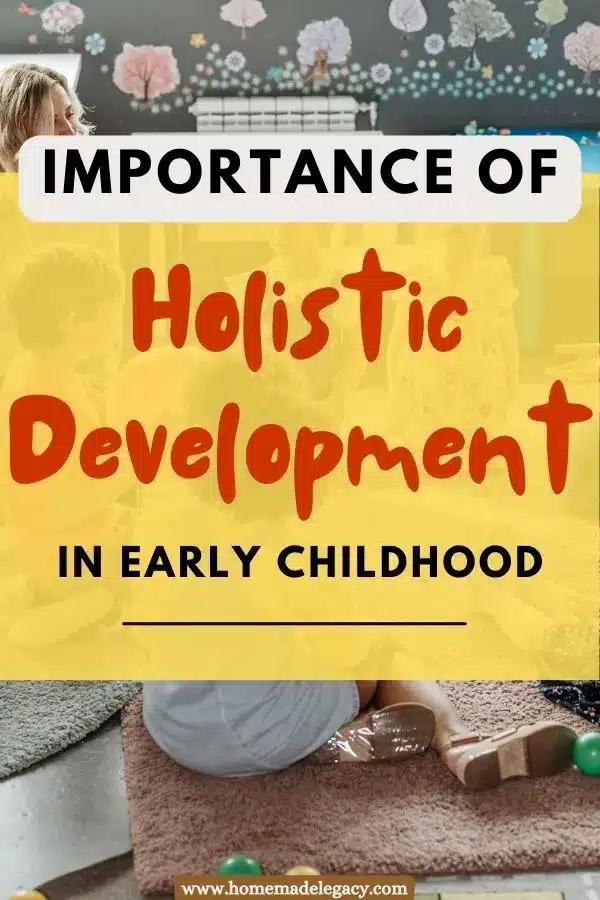
The word “holistic” itself implies the person as a whole. As parents or teachers, we always encourage and work towards building a total personality in our children.
Though, a lot of importance is given to children’s cognitive skills and gross motor skills at early stages be it their ability to crawl, count or talk etc , we have to remember that a child’s development needs to be holistic- meaning it needs to be an overall development.
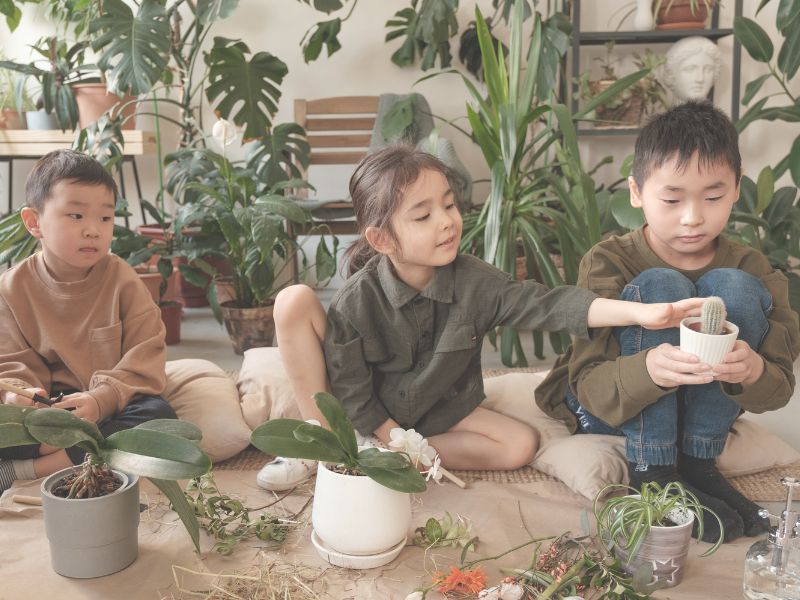
For example, a child who is a genius in literacy and numeracy but struggles to control his emotions is not going to grow up to be a total personality unless early intervention helps him acquire those social-emotional skills.
There are certain education systems that allow children to attend school early or promote one or two grades solely depending on their cognitive skills totally ignoring a child’s social-emotional skills, gross motor skills or fine-motor skills. This can have a big impact on a child’s total personality in the long run.
That’s one reason why parents and carers need to have a good understanding of what holistic development in early childhood education is.
5 Categories in Holistic Development in Early Childhood
1. Cognitive/ intellectual development
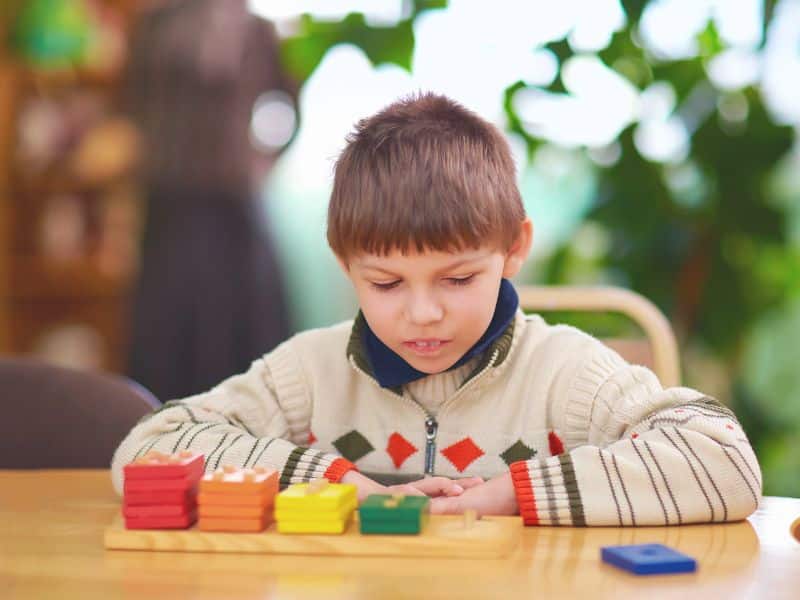
Cognitive development is the ability to think and reason. It helps us observe the world around us and figure out how everything works.
Problem-solving talents, creative thinking abilities, critical thinking abilities, and logical and analytical thinking abilities are examples of intellectual and cognitive capabilities.
What activities will develop cognitive skills in your child?
- Explore the natural world
- Playing with mud and slime
- Reading stories together
- Building blocks/ legos
- Puzzles
2. Physical development
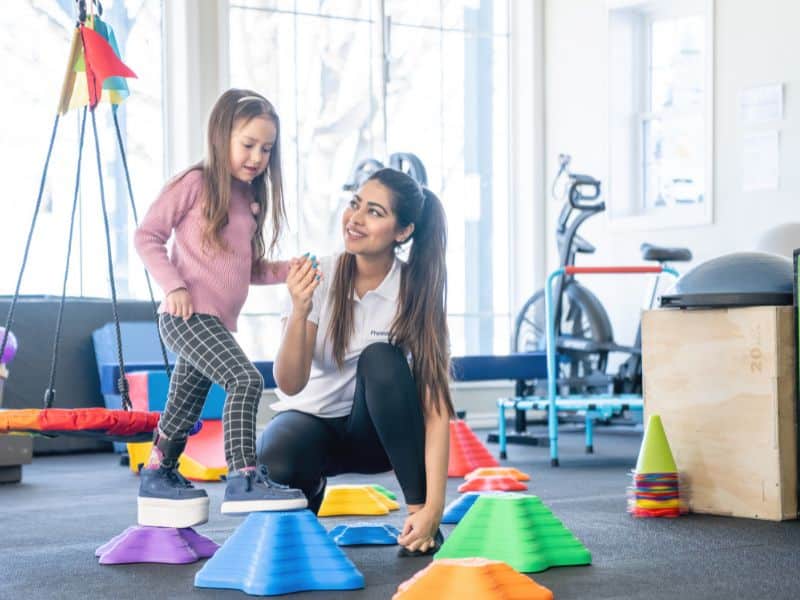
Physical development is divided into 2 groups. Gross motor skills and fine motor skills.
Gross motor skills involve using large muscles in the body to perform everyday tasks. Ex : Jumping, climbing.
Fine motor skills are activities in which you use the small muscles in your hands and wrists to make precise movements. ex: painting, sewing
What can we do?
- Encourage outdoor play.
- Providing them with scooters, bikes, trampoline etc
- Encourage craft activities
- Make a busy box containing beads, strings, paint, clay etc.
3. Social development

Involves developing close and healthy relationships with friends, educators ,relatives etc.
As children grow up they socialise more and more. They learn how to interact with people, how to build up friendships, sharing , taking turns etc which will eventually help them to build up strong relationships with the people they spend time with.
What can we do?
- Encourage them to build friendships with people other than your close family.
- Take them to parks, play dates, museums and festivals where there are so many opportunities for them to meet new friends/ people.
- Model friendly and kind behaviour.
4. Emotional development
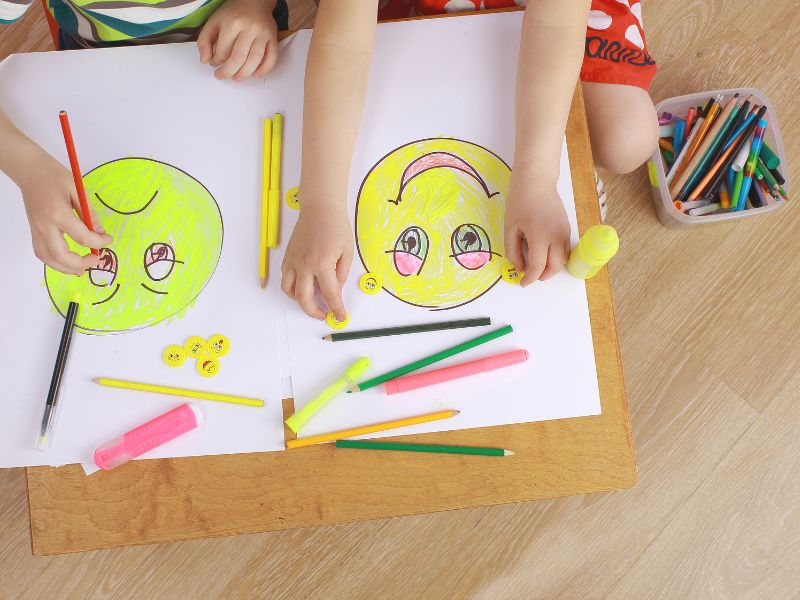
Refers to the ability to experience, regulate and express a range of emotions.
What you can do?
- Read books with them and talk about how different characters feel and the way they express them.
- Model good emotion regulation skills at home and talk about healthy ways to express your emotions.
- Sing songs about different emotions and read books about emotions. There are plenty of them that help children understand emotions better.
- If they display an outburst of negative emotions, wait until they calm down and talk about what they could have done differently.
- If you lose your temper, raise your voice or use a threatening tone, apologise. Let them know that there are far better ways to express our emotions.
5. Spiritual Capacities
This helps the child make their own moral code deciding what is right and what is wrong.
We should encourage them to take responsibility for their actions, decisions, and behaviour, while making sure to validate their feelings to establish their confidence.
From a young age, they observe and learn things like it’s not ok to hurt others, we have to put litter in the bin, help the ones in need etc.
All these qualities complement the other necessary skills to create a whole personality in your child.
What can we do ?
- Model strong moral values within the family
- Read books and discuss the moral values brought out in the book
- Appreciate their effort to do something good for the world without expecting anything in return.
Role of Play-based Learning in Promoting Holistic Development in Kids
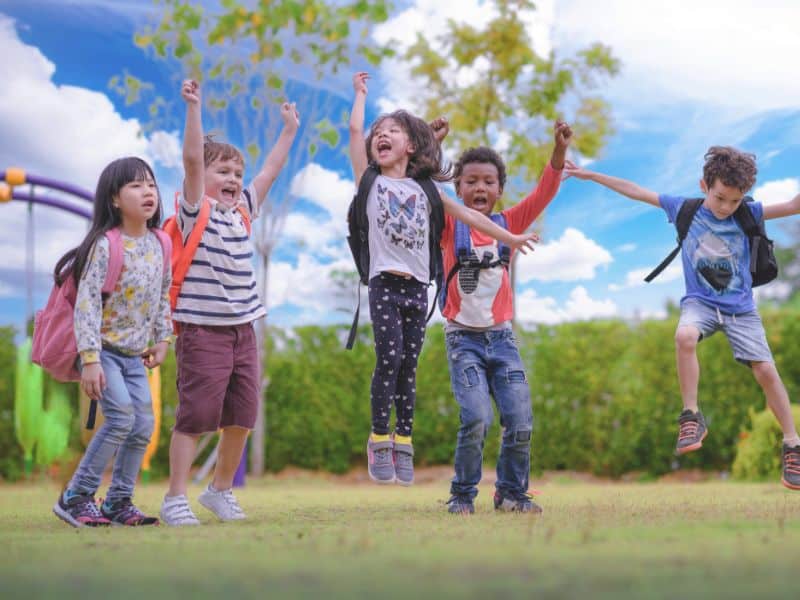
Play-based learning is a great way to stimulate motor skills in early childhood – and not just physical skills!
Through hands-on play, children can develop their motor and cognitive abilities as well as their social skills.
For holistic development in early childhood, encourage getting creative with playtime activities like arts and crafts, outdoor physical activities, dramatic play, music, and even educational games.
Not only do these activities help build important motor skills needed for school readiness, but they also foster creativity, curiosity, and critical thinking.
So get your kids involved in playtime for a fun and rewarding experience that goes beyond just working out the body!
What Do Holistic Approaches Look Like in Practice?
Taking responsibility for the development of a “whole child” however is a significant endeavour for any early childhood educator: guiding students to find identity, meaning, and purpose in life through connections to the community, to the natural world, and to spiritual values such as compassion and peace.
There are so many ways that holistic approaches can be introduced into their learning.
All learning is connected
Holistic educators know learning is intertwined and interconnected. Even when there’s a specific learning outcome, such as identifying the names of birds, holistic educators discuss bird nests, bird food, the sound of birds, bird feeders, sing songs about birds and dance like a bird. Discuss how we can protect them etc.
This paves the way for holistic learning developing their cognitive skills, gross motor skills, social-emotional skills and spiritual skills.
When a larger picture is kept in mind, learning is seen as an all-encompassing process.
Holistic learning includes others
Holistic learning encourages children to work as a group, interact with others, share and take turns. work cooperatively. It’s never about playing and learning alone.
Nature becomes a part of the process
Nature plays a vital role in holistic learning. Children learning rainbow colours, smelling sweet-scented flowers, tasting tree sap or rain water, identifying symmetry in leaves, bush walking, bird watching You name it! Nature offers millions of tiny ways for a child to develop a total personality.
Values are integrated into learning
Real learning takes place when there are values incorporated into it. Children share, take turns and learn all those unwritten laws of civility that you learn while spending time with company.
Physical health and wellbeing are made a priority
Holistic learning gives so much importance to physical health and wellbeing. Play based learning allows children to spend a considerable portion of time playing outdoors where the weather permits.
Holistic learning considers the individual child
Holistic educator caters to each and every child’s needs. If a child shows interest in wildlife, they are encouraged to learn more about wildlife animals, native plants, protecting wildlife.
Provide books and other material that will make the child more and more curious.
By supporting young children at this early stage of development, we can boost their sense of belonging.
Read about play based learning
Benefits of Holistic learning in Early Childhood
- Children develop confidence to face whatever challenges they face in life.
- They become innovative in their work.
- Children learn how to communicate with the world.
- They grow healthy.
- Recognise, control their own feelings and understand others’ emotions.
- It contributes to expanding the kid’s perspective and mindset.
- It fosters the growth of a kid’s self-confidence and maximises their full potential.
- It allows kids to use numerous skills simultaneously and comprehend more complex ideas.
- It encourages kids to acquire and use critical thinking and problem-solving techniques in the classroom.
- It inspires and encourages kids to learn and understand various concepts by implementing experiential learning techniques.
- Children develop the values of what is correct and what is wrong. It also helps them to analyse things before reacting to any situation.
Conclusion
Holistic learning promotes the learning process that eventually makes a “whole personality” meaning a wide range of skills such as cognitive, physical, social, emotional and spiritual values are incorporated in the child.
That’s how a total personality is built in your child and this article discusses what we, as parents can do to promote holistic learning in your child.
Share your thoughts with our community.

This document is well thought of as the suggestions are practical and also the need of professional educators.